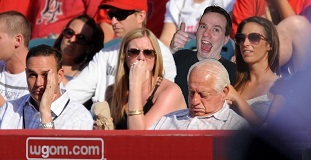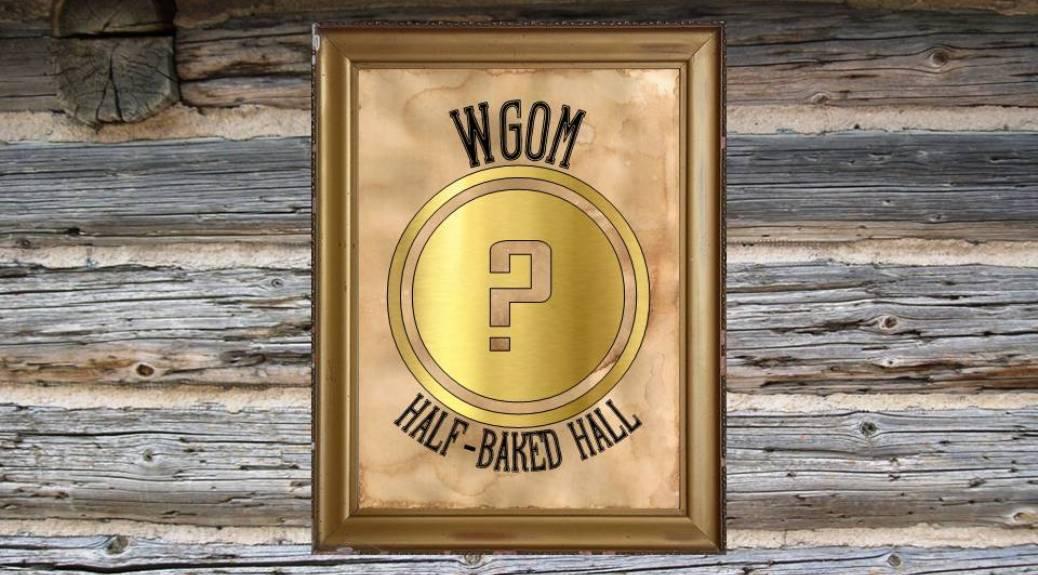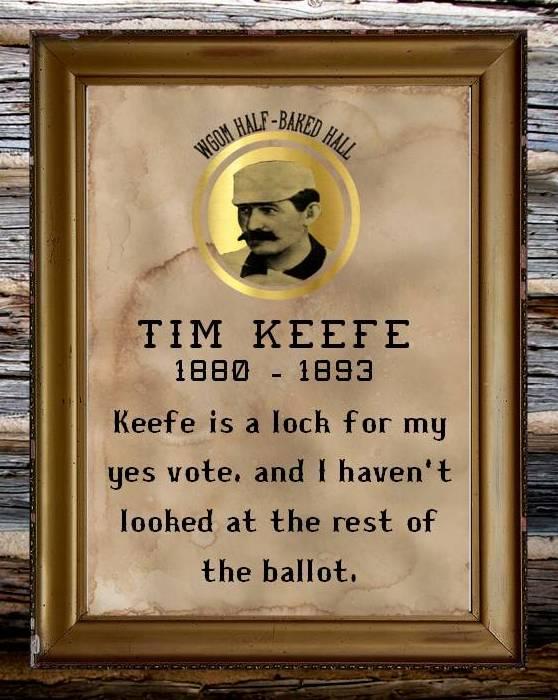The second election cycle sparked less interest than the first go-round, though we did wind up with 23 voters, including two new voters (FTLT and UncleWalt, welcome!). I understand it was a crazy few weeks for a lot of you, and I understand there could be some changes to how we do this to make the experience more fun for everybody.
Personally, I found 30 people on the ballot to be a bit overwhelming, especially since I didn't just copy/paste my votes from last time. It is definitely harder to judge 19th century players, which could be part of the problem. While some people dropped off after this ballot, a lot of them remain, and I fear they could remain indefinitely. For example, some people want Candy Cummings in for inventing the curveball. Some don't think that's HOF worthy. Is that ever going to change? Will he be stuck around 30% forever? Or will it just take more discussion to see which way that needle ticks?
It appears there was a glitch with the ballot where people who wanted to abstain weren't allowed to do so (except bhiggum, who abstained before the glitch occurred). I'll make sure to fix this for the next ballot.
Okay, onto the results. Did we elect anybody this go round?
Tim Keefe scoffs at Al Spalding's 76%, storming past him with a more decisive 77% of the vote, making him the second member of the WGOM Hall of Fame. Congratulations Keefe! And congratulations, AMR, for getting your quote on a plaque despite not voting.
Remaining On The Ballot
If a player has fewer than 20% but remains, they had enough maybe votes to get them over 20%. For returning players, their +/- from previous ballot is listed.
Ross Barnes: 64% -4
King Kelly: 55%
Jim McCormick: 55% +7
Old Hoss Radbourn: 55%
Deacon White: 55% -5
Harry Stovey: 41%
Pud Galvin: 36%
Candy Cummings: 32% -4
Bob Caruthers: 23%
Paul Hines: 23%
Charley Jones: 23% +3
Dave Orr: 23% -5
Tommy Bond: 18%
Ezra Sutton: 14%
George Gore: 14%
Larry Corcoran: 14% -2
Ned Williamson: 14% +2
Tip O'Neill: 9%
Lip Pike: 9%
Bobby Matthews: 9% -27
George Wright: 9% -7
Charlie Buffington: 5%
Will White: 5% -11
Mickey Welch: 5%
Dropping Off The Ballot
Charlie Bennett: 14%
Fred Dunlap: 9%
Dick McBride: 5% -7
Hardy Richardson: 5%
Joe Start: 5% -7
Guy Hecker: 0% -16
Henry Larkin: 0%
John Reilly: 0%



I think I forgot to make the charts public. If there's still a problem, let me know.
access request sent from my alt google address. The user name is an obvious Twins-related reference (albeit a dated one, as of this season).
now it's fixed for realsies. Everyone has access.
Could we eliminate the "Maybe" vote for a player after they've appeared x number of times on the ballot?
After a few times through, people have to decide one way or another on them?
Makes perfect sense. I do wonder if we'll see more "maybe" votes in the beginning because we're all figuring out how to value 19th century players, and players in general while we're determining our own HOF baselines.
Geoff is going to take this news hard.
I didn't notice that until now. Hmmm, yeah he might have to change his criteria.
Heh. I think that was a "Oh crap, I forgot to vote and I have no time. Let's make sure nobody falls off the ballot." Now that I think about it, I think I specifically stated I wouldn't accept a ballot of all maybe votes, but it's too late now. And it didn't keep anyone from being elected, just kept a couple people from leaving (including Mickey Welch) from being kicked off the ballot.
I don't agree with this for this era. I know at least I'm going back and forth on a few players, I'm reading more about baseball history in my spare time than I ever have. I find it hard to believe that that will continue. The first era is so hard to quantify, but I think that makes the maybes more important that they would be in the what 30's +?
I agree that maybe votes are more important in this era than they will be later.
My suggestion was aimed at trimming more players off the bottom of the ballot so that the ballot isn't overwhelming. Whether that's a worthy goal is probably something that should be established before we talk about ways to achieve it.
I'd like to see the ballot trimmed.
I think we could make this incumbent on the voters though. An informal rule that says something like "after two maybes, please decide one way or the other?"
Trimmed faster or lower max?
Would raising the percentage needed help at all? Is it likely we'll ever elect somebody that starts below 25%?
A cap on maybes you can use pet ballot?
Trimmed faster. A cap on maybes makes sense to me. 25% is probably just fine too.
I like the idea. I doubt I'm going to convince myself any of my maybes should turn to yes's, and since I have to do all of this at lunch at work, its a bit daunting to go through an increasingly larger ballot.
Crap. I'm so gonna vote eventually.
Glad Keefe made it without my help.
For those who didn't vote for him:
Why no Charlie Radbourn?
This is something I'm wondering as well. Hype aversion?
Personally, I wanted to see what other people thought about this era. In going through this process I'm learning a lot; and also trying to catch up on some of the history, but this era is a bit overwhelming for me. This has also lead to me thinking a lot about if I want to be a "small hall" or "big hall" sort of person. I still don't know, and this era makes it really tough.
I enjoy the twitter feed as well, but that didn't really matter to me much.
On the one hand, I'd like to give this era extra credit for being "first" but I'm trying to reconcile that with how I know I'll vote down the line. I probably just need to get over the fact that comparisons can't/shouldn't always be made.
I've struggled with the same. For this era I'm trying to only worry about comparing them to each other, which is difficult enough.
I found out that I'm a small hall kind of guy. I've voted a straight NO slate in both elections. For me, the rules were just too different, the competition suspect as was the record keeping. I'm not going to argue to take that same view as me as everyone has different criteria.
For me it was a toss-up between McCormick and Radbourn. McCormick was slightly better to my eyes, so he got a yes and Radbourn got a maybe.
I don't understand how my lobbying for Ross Barnes and Deacon White caused them to fall backwards.
Some people who voted for them before didn't vote this time. Part of reason anyway.
My maybe on Barnes was entirely due to my not having sat down and figured it out. I promised myself that I would take a good hard look at his case this time and make a decision yes or no.
You are a political albatross.
Some thoughts I promised on decreased participation:
1. The era. It's well over 100 years ago and the game was so very different that baseball's tradition and history no longer apply.
2. The number of players. Faced with not having a starting point for evaluating these players and having to do it to 32 players, it's a daunting task.
3. The realization this is going to take years. The number of years in each election will decrease to one before too long, so we're looking at about 50 more elections, each taking maybe a month.
I don't have solutions. Perhaps grouping all of the players either by birth year or retirement year, and then skipping around might keep interest better as we will include players and eras people remember and know. It would make elections rather strange though.
I think jumping around would certainly keep interest better. I really don't want to see the same name 3 times or more in a row.
If we don't, people who are abstaining from voting for 19th century players may not get involved in the project until next year or further down the road.